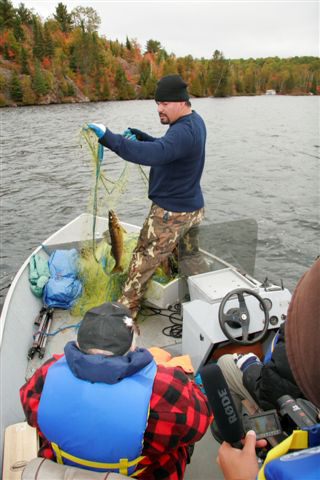Harper Conservatives’ 2012 Omnibus Bills significantly harm Anishinabek fisheries

By Joey Krackle
The Anishinabek leadership was steadfast in their protest and opposition to Omnibus Bills C-38 and C-45 and protested strongly against this legislation which caused significant damage to the Anishinabek fishery and our citizens’ rights to hunt and fish.
It is important to point out that the Robinson Huron Treaty of 1850 stated: “to allow the said chiefs and their tribes the full and free privilege to hunt over the territory now ceded by them, and to fish in the waters thereof, as they have heretofore been in the habit of doing”
The Harper Conservatives introduced Bill C-38: An Act to Implement Certain Provisions of the Budget tabled in Parliament on March 29, 2012 and other Measures. This bill received royal assent on June 29, 2012. The implementation of Bill C-38 significantly changed federal environmental law by amending or repealing over ten pieces of federal environmental legislation. Major changes were made to the federal environmental assessment law, fisheries law, and the operation of the National Energy Board.
On October 18, 2012, Harper introduced Bill-C-45: A Second Act to Implement Certain Provisions of the Budget Tabled in Parliament on March 29, 2012 and Other Measures. This legislation included amendments to the federal environmental assessment law, fisheries law and the law protecting navigable waters. Provisions of Bill C-45 will allow authorizations issued under the old Fisheries Act to be amended or cancelled. This means that commitments made under existing authorizations, including compensation for lost or damaged fish habitat may be amended or cancelled by the Minister.
It can be argued that the most significant change to federal environmental law under Bill C-45 is the law protecting Canada’s navigable waters. The Navigable Waters Protection Act (NWPA) was renamed the Navigation Protection Act which apparently reflects the government’s intention to remove environmental concerns of protecting Canada’s navigable waters. The NWPA protected navigation rights on Canada’s waters. However, under Bill C-45, the federal Cabinet may choose to exempt any rivers, streams, or waters from protection if such an exemption is in the public interest. Furthermore, the Minister may designate dumping places for depositing stone, gravel, earth, cinders, ashes or other material even where there is not a minimum depth of 36 metres of water.
Prior to Bill C-45, the main role of the NWPA has been to regulate the construction of works in, on, over, under through or across navigable waters. However, under Bill C-45 the prohibition against construction of works in, on, over, under, through or across navigable waters is limited to 3 oceans, 97 lakes and portions of 62 rivers- a very small portion of Canada’s waterways.
Recently, APTN featured a statistical analysis by University of Calgary law professor Martin Olszynski, which determined that the Harper Conservative’s changes to environmental laws and procedures suggests that Ottawa has “all but abandoned attempts to protect Canada’s lakes and rivers”.
He further concluded that “over the last decade, what we’ve seen is a not so gradual abandonment of the fish habitat protection field”.
After sifting through reams of data and dozens of development applications he concluded that the federal protection of fisheries and waterways has been declining for over a decade. The data demonstrated that environmental oversight by the Department of Fisheries and Oceans dropped dramatically during the 2000’s at a time when Canada saw huge spending in resource industries.
In a paper for the Journal of Environmental Law and Practice, Olszynski shows that the number of proposals to the department’s Central and Pacific regions fell by more than 50% in 2014 as 4,000 applications were received in comparison to more than 12,000 in 2001. During the same period, enforcement fell dramatically. His data demonstrated that environmental warnings and charges under the Fisheries Act fell to about 50 from 300. Staff time allotted to enforcement dropped to 10,000 hours from 35,000. The department’s budget was cut by $80 million in 2012 and another $100 million in cuts are planned over the next three years.
His analysis shows that officials are granting approvals without seeing a developer’s plans to fix any problems, despite federal law which says such plans must be approved before a project goes ahead. Olszynski’s suggests most approvals are now granted with the understanding a developer will file a plan later.
We can conclude that the drastic changes from the 2012 Conservative omnibus bills had a significant impact in the Anishinabek Nation territory fishery as is evidenced in Lake Nipissing where stocks have been seriously depleted and enforcement is a major issue.
We regret that impacts of these omnibus bills on our Anishinabek livelihood and can express serious concern over what surprises that Harper Conservatives plan if they are re-elected after October 19, 2015.


